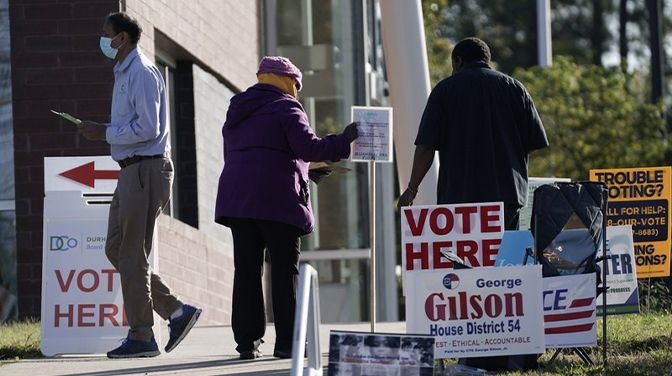RALEIGH, N.C. (AP) — A photo voter identification mandate first sought over a decade ago by North Carolina Republicans could be revived after the state Supreme Court reheard on Wednesday a case that led a different combination of justices a few months ago to strike down a voter ID law.
What You Need To Know
The N.C. supreme court is taking another look at the 2018 ruling that declared voter ID laws unconstitutional
Democrats claim voter ID requirements will hinder minority groups ability to vote
According to the National Conference of State Legislatures, thirty-five states require a form of ID verification when voting
The justices agreed last month to take a second look at the court's December ruling that upheld a trial court ruling that declared a 2018 voter ID law was unconstitutional, tainted by racial bias and designed to help Republicans retain their grip on power at the General Assembly.
That ruling was penned by the 4-3 Democratic majority on the court. But Republicans have held a 5-2 seat advantage since January, the result of two associate justice election victories in November by GOP candidates.
This latest edition of the court soon granted requests by Republican legislative leaders to rehear separate voter ID litigation and redistricting litigation decisions. Rehearing a case is an option for the court when someone contends justices "overlooked or misapprehended” facts or laws, but it’s only happened two other times in the past 30 years, according to one justice.
The justices held the redistricting rehearing on Tuesday. There is no timeline set for when the court will rule in either case. The justices could restore the 2018 law, which has never been used in an election, or direct trial judges to scrutinize the law again using different standards.
During Wednesday's voter ID arguments, four of the court's five Republicans defended the ability of justices to rehear the matter, or expressed skepticism about rulings from a three-judge panel that held a trial on the law or the previous edition of the Supreme Court. Democrats and their allies say this week’s hearings happened solely on the partisan makeup of the court.
A chief issue on appeal is whether the judges who struck it down relied too heavily on a 2013 voter ID law and a decision three years later by a federal appeals court that struck it down on the basis of racial bias.
Attorneys for the minority voters who challenged the 2018 law have said the trial judges were able to consider the history surrounding the 2013 law as part of the broader circumstances in determining whether legislators acted in part with discriminatory intent.
For example, the lawyers contend, dozens of legislators in 2018 who also voted in 2013 for voter ID likely knew about previous studies showing Black voters are more likely to lack qualifying photo IDs than white registered voters. But they pushed the 2018 law through anyway, said Paul Brachman, who represented the plaintiffs on Wednesday.
Peter Patterson, an attorney for the GOP legislators, said the courts wrongly presumed the 2018 law was tainted as well. The evidence affirmed the law was constitutional by providing more ID options and offering the ability for people to cast ballots even if they lack an ID by filling out a form. Patterson also pointed out the measure had support from some Democrats, including a Black senator.
“Factually, the record in this case does not support a finding of racially discriminatory intent under any potentially applicable standard of review,” Patterson said.
Associate Justice Phil Berger Jr., a Republican, questioned whether under Brachman's viewpoint identical voter ID legislation could ever be approved.
“I think of it like fruit of the poisonous tree," Berger asked. "At what point is the taint removed such that this legislation in your argument could be passed by the legislature?” Brachman offered no bright-line answer, except that circumstantial evidence surrounding the law's passage would be reviewed.
The lack of direct evidence from a legislator stating the 2018 law was passed out of racial animus or to disenfranchise voters “does nothing to undermine the correctness of the trial court’s judgment or this court’s ruling affirming it," Brachman said.
Republicans at the legislature, which first passed a voter ID law in 2011 that was vetoed, say requiring identification at the polls will bolster confidence in elections, root out any voter fraud and is broadly popular. Voter ID critics say the incidence of such fraud is overblown. Thirty-five states request or require some ID at the polls, with about half asking for photo identification, according to the National Conference of State Legislatures.
Berger is the son of Republican Senate leader Phil Berger, who is a named defendant in the lawsuit. The younger Berger wrote the dissenting opinion in December. Associate Justice Anita Earls, a Democrat who wrote the majority opinion, once represented litigants challenging the 2013 law in state court.



